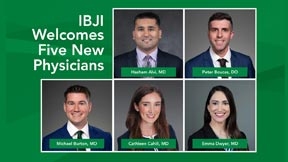This article is part of the the Ultimate Guide to Hip Pain Relief.
There are many conditions and diseases that may result in hip pain. Hip pain can not only put a damper on the activities you once loved, but in some cases the underlying issue may be causing more damage than you think.
One such disease is osteonecrosis, also known as avascular necrosis (AVN). Osteonecrosis of the hip is a rare, but is a serious cause of hip pain and disability.
IBJI recently chatted with Dr. Jeffrey Ackerman, board certified and fellowship trained orthopaedic surgeon. He is a comprehensive hip surgeon who is an expert on avascular necrosis of the hip and is one of a select group of surgeons that performs core decompression with autologous stem cell treatment for avascular necrosis. Dr. Ackerman tells us the main things that are important to know about osteonecrosis of the hip. His responses—below—have been edited and condensed for space.
What is Osteonecrosis of the Hip?
“Osteonecrosis involves an interruption to the microvascular blood supply to the femoral head, or ball of the hip joint,” says Dr. Ackerman, “Similar to cutting or blocking the roots to a tree, parts of the femoral head can begin to die. Depending on the severity, it can lead to complete destruction of the femoral head leading to severe, debilitating pain, necessitating hip replacement surgery.”
Causes of Osteonecrosis of the Hip
Common causes of osteonecrosis include:
- Certain medication side-effects
- Chronic alcohol use
- Hereditary conditions

Learn more about osteonecrosis of the hip from IBJI. “Image by: BEAUTY STUDIO/Shutterstock.com“
Stages of Osteonecrosis
The earliest stages of osteonecrosis are often painless and asymptomatic. In the early stage, advanced MRI imaging is required to appropriately identify and assess. Dr. Ackerman explains, “Similar to a sink-hole that develops, early stages can go unrecognized and often only presents after collapse of the sink-hole or articular surface of the hip.”
Treatment for Osteonecrosis
There is excellent treatment for all stages of osteonecrosis. Success rate of treatment will depend on appropriate and early diagnosis. The initial goal for these patients is to stop disease progression and reverse the initial damage.
“While, there is no specific medication approved for osteonecrosis, there is exciting research with the use of osteoporosis, bone-stimulating medications. There is surgical treatment which involves precise drilling into the area of the femoral head to restore blood flow. The patient’s own stem cells and growth factors, taken from the nearby pelvis bone, can be delivered to the site of damage to successfully heal early stages of disease. Late stages of the disease with collapse of the femoral head are successfully managed with minimally invasive hip replacement surgery,” says Dr. Ackerman.
Each individual’s disease can progress at a different rate, and unfortunately predicting prognosis is still difficult and uncertain. Seeking treatment from an osteonecrosis hip expert can provide you the options to successfully manage this painful and debilitating condition.
Get Relief from Your Hip Pain Today
Hip Care and Treatment at IBJI
Whether you are just starting out in your hip care journey or need a second opinion for your hip pain, IBJI’s hip surgeons are here to help provide you with the necessary care for your ailment. Get the relief you are seeking with the help of IBJI.
Schedule online with an IBJI hip surgeon to discuss treatment options and create an individualized approach to your care.
Check out IBJI’s additional online resources for hip care to learn more about conditions and read patient testimonials.
Schedule online with a Hip Doctor →
You might also like ...
- Osteoarthritis Hip Pain: Symptoms & Treatment
- Common Causes of Hip Pain and When to Seek Treatment
- Hip Degeneration Solved by Joint Replacement: Stella’s Story
*This content is for information only and is not intended to replace the diagnosis, treatment, or medical advice from your treating healthcare professionals. The content does not provide medical advice, does not constitute the practice of medicine or other healthcare professional services, and does not create a doctor-patient relationship. You should not rely on this information as a substitute, nor does it replace professional medical advice, diagnosis, or treatment. If you have concerns or questions, seek the advice of your healthcare professionals. If you think you may have a medical emergency, call your doctor or 911 immediately. Do not rely on electronic communications or communicate through this website for immediate, urgent medical needs. This website is not designed to facilitate medical emergencies. The use of the information is at the reader’s own risk. The links are provided for information and convenience only. We cannot accept responsibility for the sites linked or the information found here. A link does not imply an endorsement of a site.





